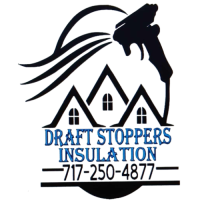Central Pennsylvania Spray Foam, Attic Blown-In, Fiberglass Batt, Air Sealing and Blower Door Testing .
Insulation 101
What is Home Insulation?
Residential insulation plays a crucial role in maintaining a comfortable and energy-efficient home environment. Insulation helps regulate the temperature inside a house by minimizing heat transfer, both in terms of heat gain during hot weather and heat loss during cold weather. Here are some key points to understand about residential insulation:
Types of Insulation:
- Fiberglass Insulation: Made of tiny glass fibers, it is one of the most common types. It comes in batts, rolls, or loose-fill forms. Can be used in almost all areas of a building.
- Cellulose Insulation: Made from recycled paper or cardboard treated with fire retardants. It is often used as loose-fill insulation. Used almost exclusively in attica & walls.
- Spray Foam Insulation: This expands upon application, creating a tight seal. It's effective in various spaces, including walls and attics.
- Rigid Foam Board: This type comes in large, rigid panels and is often used in specific applications like exterior wall sheathing or under slabs.
R-Value:
- The thermal resistance of an insulation material is measured by its R-value. The higher the R-value, the better the insulation's ability to resist heat transfer. The appropriate R-value depends on factors such as climate and building design.
- Central PA is considered Climate Zone 5
- Common building codes for CZ5 include: Ceiling = R-49, Floors = R-30, Exterior Walls = R-20
Areas to Insulate:
- Attic: Insulating the attic is crucial, as heat tends to rise, and a well-insulated attic helps prevent heat loss in the winter and heat gain in the summer.
- Walls: Insulating exterior walls helps maintain a consistent indoor temperature.
- Basement & Crawl Spaces: Insulating these areas is essential for controlling temperature and moisture levels.
- Windows & Doors: While not exactly insulation, energy-efficient windows and doors with good seals contribute to overall energy efficiency.
Installation Considerations:
- Insulation should be installed properly to be effective. Gaps or compressions in the material can reduce its efficiency.
- Proper ventilation is crucial to prevent moisture buildup, which can lead to mold and other issues.
Energy Efficiency:
-
Insulation helps reduce the need for excessive heating or cooling, leading to lower energy bills and a smaller carbon footprint.
Enviromental Considerations:
- Some insulation materials are more environmentally friendly than others. Consider materials with high recycled content or those that are easily recyclable.
Enviromental Considerations:
- It's advisable to consult with a professional to determine the most suitable insulation type and R-value for your specific home and climate.
Remember that proper insulation is part of a holistic approach to energy efficiency, which may include other measures like using energy-efficient appliances, sealing air leaks, and adopting smart home technologies.

